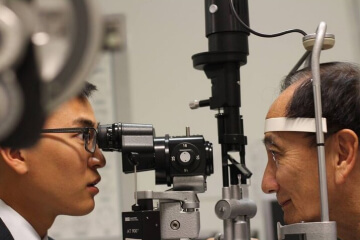
At Solar Eye Care, we prioritize both precision and personalized care. Our advanced diagnostic tools and generous appointment times help us detect, manage, and prevent eye conditions—long before symptoms appear.
Advanced Technology for Preventative Eye Care
We invest in modern technology like OCT scans and ultra-widefield imaging to provide a higher standard of care. In Calgary’s dry climate, eye strain, meibomian gland dysfunction, and dry eye disease are increasingly common—especially with more screen time.
Our exams are designed to identify hidden eye conditions early and tailor solutions to your lifestyle and visual needs.
How Often Do Adults Need Eye Exams?
- Recommended Frequency: Healthy adults: Every 1–2 years
- With risk factors (e.g. diabetes, high myopia, family history): Annually
- Remember: even if your vision feels unchanged, serious eye diseases like glaucoma can develop completely undetectable. Detecting subtle changes over time is key to protecting your vision long-term.
Digital Eye Strain Is Real
Learn More About the Impact of Screens
Meibomian Gland Dysfunction (MGD)
Screen time reduces blinking, causing oil glands to stagnate. This leads to dryness, irritation, and blurred vision. We can diagnose and treat MGD early to preserve long-term comfort.
Contact Lens Intolerance
Dryness from our environment/screens can make contacts uncomfortable. We recommend newer lens materials or dry eye treatments tailored to your needs.
Presbyopia & Accommodative Fatigue
Frequent near work can cause blurry vision or eye strain. We’ll evaluate your near-focusing ability and recommend customized lens solutions to improve comfort and productivity.
Cataracts
Cataracts are inevitable with age. When glasses no longer provide clarity, we refer for surgery—a quick, effective procedure where the clouded lens is replaced with a clear implant. We guide you through all the lens implant options, including multifocal lenses for added visual range. We take care of pre and post surgical care at our clinic.
Glaucoma
Known as the “silent thief of sight,” glaucoma causes irreversible vision loss if not caught early. Due to being painless and slow, it is usually undetectable by the patient until blind. Regular exams with OCT and visual field testing help us detect glaucoma before vision is lost. Most cases are managed with eye drops, but advanced cases may need laser or surgery.
Macular Degeneration
Macular Degeneration affects central vision, making it hard to read or recognize faces in severe cases- if mild there are no symptoms. Smoking, UV exposure, and poor diet increase your risk. We use 3D retinal scans to monitor changes and recommend supplements, home tests. We will refer to a retina specialist if you turn “wet” and injection treatments are needed.
Diabetic Retinopathy
Diabetes can damage your retina even before symptoms appear. Regular eye exams with retinal imaging detect early signs of diabetic eye disease. We can take care of monitoring mild and moderate cases, but if needed, we can refer you to a retina specialist for advanced treatments like injections or laser therapy.
What to Expect at Your Eye Exam
Pre-Exam Testing
Pretests: The Foundation of Accurate Results
Lensometry: Digital measurement of your current glasses to understand what you are used to.
Cornea and Glaucoma Screening: Eye pressure, corneal curvature, and thickness with a single automated device.
Retinal Imaging and Optomap: High-resolution and ultra-widefield scans to detect conditions like glaucoma, diabetic retinopathy, and retinal detachments.
Optical Coherence Tomography (OCT): Used when needed for 3D imaging of the retina, optic nerve, or cornea.
Peripheral Vision Testing: Used when needed to assess for glaucoma, stroke, brain tumors, or licensing requirements.
During Your Appointment
Doctor of Optometry Exam – Thorough & Tailored
- Discussion of your visual concerns and comfort
- Review of personal and family medical history
- Review of pretest imaging results
- Brief neurological checks: pupils and eye movement
- Vision testing and precise prescription using digital phoropter
- Tailored recommendations for work, hobbies, and daily vision
- Front-of-eye health check (eyelids, lashes, cornea, lens, iris, tear film) using LED slit lamp
- Back-of-eye exam (optic nerve, macula, retina, blood vessels), with dilation if needed
- Education about findings and treatment plans for conditions like:
- If needed:
- Additional tests (OCT or visual field)
- Referrals to specialists (ophthalmologists, endocrinologists, etc.)
- Medical letters for family doctors or other care providers
After Your ADULT EYE EXAM
- Receive a glasses/contact lens prescription, printed educational materials, invoice for insurance
- Visit Costco Optical for free contact lens fitting or browse their glasses selection
(or shop anywhere you like—there’s never any sales pressure here)
